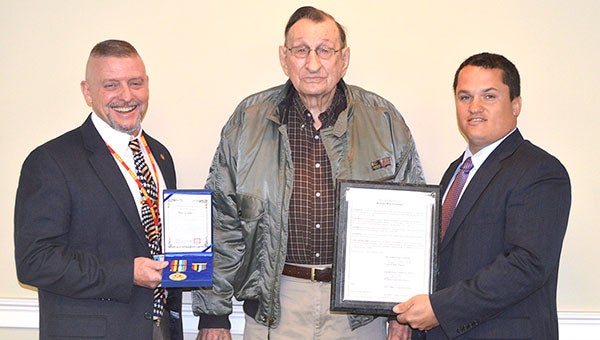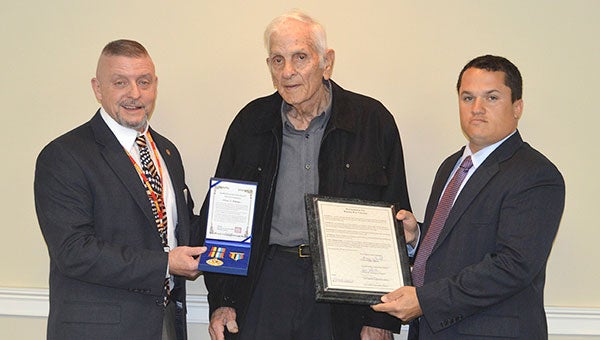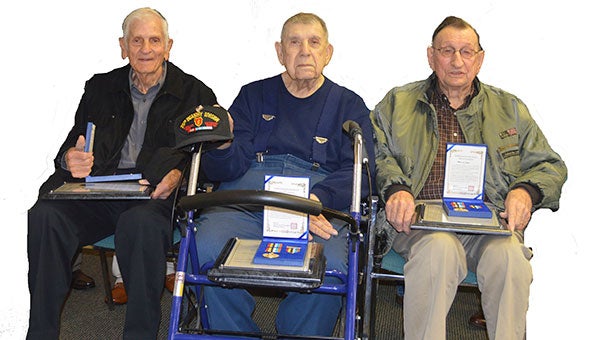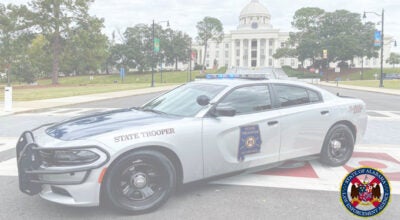Ambassadors of Peace: Veterans recognized for service in Korea
Published 2:13 am Wednesday, February 13, 2019
Charles E. Wratchford was a 16-year-old West Virginia boy when he joined the Army in 1950.
“I didn’t have nothing else to do,” he said. “In West Virginia, there was nothing to do except throw rocks.”
It turns out that throwing hand grenades is similar to throwing rocks, but it would be months later that Wratchford – still a boy when faced with the hand grenade proposition in Korea – would learn that.
Wratchford was one of three veterans of the Korean conflict honored with the Ambassador for Peace medal from the Republic of Korea yesterday. William J. Robinson and Abner Gillis Jones also were recognized.

Veterans Service Officer Brian Foshee, Charles Wratchford, and Commissioner Kyle Adams. The county commission presented each veteran with a proclamation.
Wratchford, now 88, said his older brother had served in World War II. He tried to enlist in his hometown.
“I told the sergeant, ‘I wanta join the Army,’ ” he recalled. “He said, ‘Get outta here. I know how old you are.’
“I’m hard-headed, so I got my old No. 1 thumb out and hitchhiked to Winchester, Va. I talked to the sergeant. He said, ‘How old are you?’
“I said, ’18.’ He said, ‘No. You’re 17.’ ”
“OK. Seventeen.”
The sergeant told him a bus would take him to Fort Bragg, N.C. the next day. He had no idea that paratroopers trained at Ft. Bragg.
He said the training area had just been cleared, and on his last jump, he hit a stump. He woke up in the hospital in a partial body cast. He opted to retrain for the infantry rather than rejoin the paratroopers.
In Korea, he worked in communications, and kept lines open for an English tank unit, a Turkish brigade, and a Greek unit, as well as U.S. Marines.
“They had incoming artillery, and they told me the telephone was out,” he recalled. “I got down there, turned, and found two Marines lying down.
“I said, ‘What’s wrong?’ They didn’t speak because they were dead.
“I was just a young kid. I looked down and said, ‘Hand grenades.’
“There were four North Koreans, just peppering the Marines,” he said. “I said, ‘Now, what do I do? Oh. Hand grenades.
“I’m a good West Virginia boy, and I know how to throw them rocks. I got down low and threw it. It said, ‘bomp, bomp,’ and the North Koreans got silent.”
Wratchford went up the hill, and ended the misery of the surviving North Korean, he said.
“About that time, a captain of the Marines came up and said, ‘Good job. I can get you a Silver Star for that.’ I said, ‘Uh-uh. No Silver Star. My company commander, he don’t like me. I’ll get the telephones working.’ ”
He never got the Silver Star.
Another time, he came under fire, and the artillery went just through the skin of his arm.
“One of the big wheels said, ‘Go down to the medics. We’ll get you a Purple Heart.’ I said, ‘No way.’ So our medic put sulfur powder on it, wound it up, and here I go.
“The next time when we got hit, we were on a river bed, going back toward North Korea. Something hit my stomach. It was hot.”
Wratchford reached for his bayonet and pried the shrapnel out.
“It was still hot,” he recalled. “They told me to go back, and get with the medic. I said, ‘No. I’ll stay here with these boys.’ The medic patched me up again.”
Wratchford said there were days when the temperature was 60 below zero and the snow was deep. It occurred to him that in his olive, drab uniform, he was a plain target.
He served a total of 21 years in the military, including a return trip to the DMZ, and two duty stations in Germany. He wanted to reenlist and go for 30 years, but learned he had heart trouble, and was advised to go home and take care of himself.
It was during a stint at Fort Rucker, on the way back to the base from a trip to Montgomery, that he met the young woman who would become his wife. Sixty-five years later, the couple is retired in Alabama.
During those 21 years, he said, his best job was as a drill sergeant. The work kept him stateside during the Vietnam War, training soldiers rather than going back to the front.
After retiring from the military, he worked with the Opp Police Department.

Veterans Service Officer Brian Foshee, Gillis Jones, and Commissioner Kyle Adams. The county commission presented each veteran with a proclamation.
Gillis Jones
Unlike Wratchford, Jones didn’t volunteer to join the military.
“They joined me,” he said. “I was inducted on the 25th of October, 1950.”
He was working for Vanity Fair in Monroeville, a job he enjoyed more because he was a member of the company’s basketball and baseball teams. He trained in Indiana, and went straight to Korea by sea. The trip was so rough, he said, soldiers were sick most of the way over. He was fortunate, he said, because he could afford to buy soda crackers from the commissary.
“We landed in April, I believe,” he said.
He was in the 24th Infantry Division, a heavy weapons company, and a soldier who quite fortunately wore out his only boots.
“I had big, narrow feet,” he said. “As luck would have it, I had to be brought back from the front to the kitchen to stay until I could get boots.”
Someone was rotating out, and he quickly volunteered that he could cook.
The remainder of his time in Korea, he was either cooking, or delivering food to the front. It was so cold, he said, that coffee would freeze on the lip of the cup. The river was frozen so solid, the soldiers could drive tanks on it.
“I cooked in big amounts,” he said. “We’d make a 25-gallon pot of coffee. We took the food up to the front in a jeep. When you went up, you had to give the password. One night when I went up, I forgot to get the password for that night. I had to go back and get it. I was scared to death I’d be shot.”
Jones said the soldiers wore as many clothes as they could, and slept in down feathered sleeping bags.
“If you got in the fox hole and zipped up, it’d keep you warm,” he said. “One of the beatin’est things, when I worked in the kitchen, we had one of those monsoon rains.
One night, I woke up floating out of the tent.”
His air mattress had become a flotation device.
Another time, they were preparing to serve a meal to a platoon that had come down to get a shower.
“The Chinese and North Koreans started shelling,” he recalled. “It hit right at our tent, and the artillery went over us like a covey of steel. It knocked holes in the steel ovens.”
On that day, a new recruit who’d been brought to the camp was so frightened by the incoming artillery that he jumped out, and was wounded.
“We heard from him months later,” Jones said. “He’d been sent to Tokyo, and then back home.”
It was a North Korean female soldier who was calling in the artillery that day, Jones said.
“They got up there and captured her,” he said.

Veterans Service Officer Brian Foshee, William Robinson, and Commissioner Kyle Adams. The county commission presented each veteran with a proclamation.
William Robinson
Robinson also was drafted. The Aliceville native was working in Micolas Mills in Opp, and was about 22 years old when he was called to the service. Ironically, he’d been shot twice before he ever made it to the Army.
“I was going to school, and Daddy was gonna kill hogs, so I had to stay to help him,” he said. “The hog was in the pen, and she turned around about the time he shot. It hit me in the hip.”
The second time was just before he was drafted, when he was accidentally shot while squirrel hunting.
“When I went up for the exam, I told them about it,” he said. “They said, ‘You’re all right.’ ”
That bullet was actually removed after he got to Korea.
One of his first memories of Korea is of children begging the American soldiers for their rations as they were traveling toward the front shortly after arriving. The memory still brings tears to his eyes almost 70 years later.
In Korea, his anti-aircraft unit protected Kimpo Air Field.
“We shot a lot of planes down protecting that airfield,” he said.
Robinson was up for promotion to sergeant when the colonel asked if he intended to stay in the Army.
“I said, ‘Nope. Sure ain’t.”
Stateside, he returned to work in the mill in Opp.






